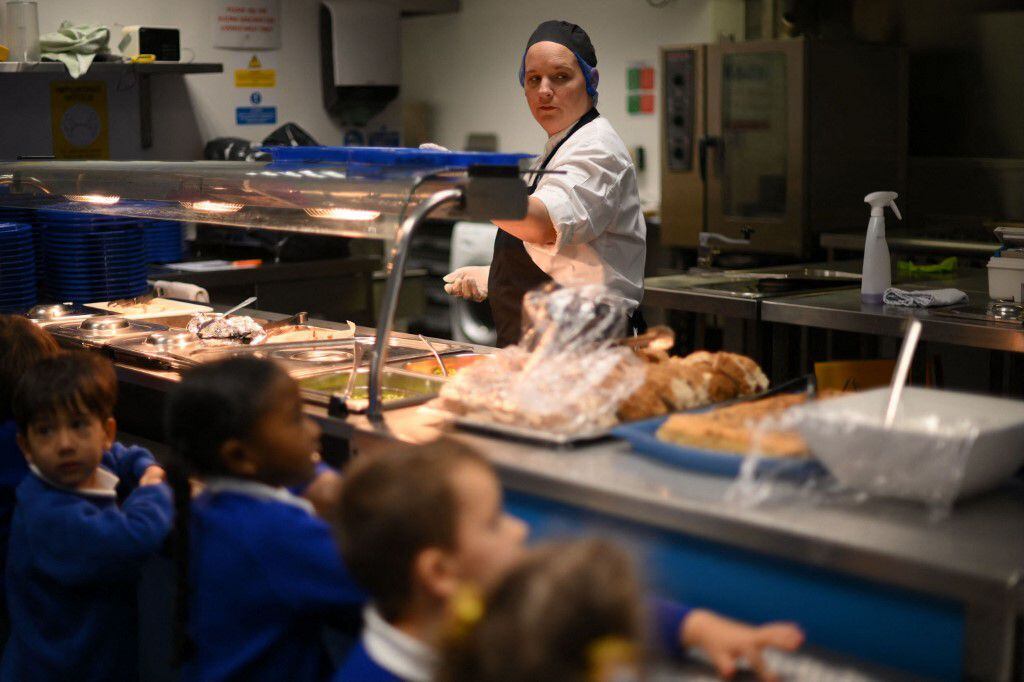It’s nearly noon in the cafeteria at St Mary’s Elementary School in South Londonwhere some families have difficulty paying for their children’s lunch.
LOOK: Asylum for a former minister convicted of corruption that confronts Ecuador and Argentina
The schoolchildren, in blue uniforms, arrive in lines. Some take a tray with chicken and vegetables, the daily special, and sit around the plastic tables. Others eat a cold lunch, brought from home.
Many of the students at this school come from poor families, and half of them receive a free meal in the canteenfinanced by the government.
But not all households qualify and, in the midst of the economic crisis, some parents have a hard time paying for the £2.40 lunch (a little less than three dollars or euros).
Claire Mitchell, deputy director of the center, says that the economic situation of families has worsened since the pandemic, and has only worsened with the crisis of rising prices.
“Families have lost their jobs or work hours. (…) And in a city like London, where prices keep going up, they can’t make ends meet.“, He says.
Inflation in the UK is approaching 11%, and prices go much higher on energy or food bills.
The most vulnerable are the most affected.
The British media collect stories from around the country of teachers and even children sharing lunch with students who have next to nothing in their lunchboxes.
St Mary’s has its own food bank, and more and more parents are asking to come pick up supplies, says Mitchell.
But you know that others hide their financial difficulties out of pride or fear of stigma.
“We live in one of the most prosperous cities in the world, it’s shocking,” he says.
According to the charity The Sutton Trust, which conducted a survey among teachers, The number of children whose families can no longer afford to pay for school lunches has risen in half of England’s public schools as a result of the cost of living crisis.
– Long-term repercussions –
“You must earn a maximum of £7,400 a year, on top of welfare benefits, to qualify for free school mealswhich is too low a limit,” Stephanie Slater, founder of the School Food Matters charity, told AFP.
The Child Poverty Action Group (CPAG) estimates that 800,000 poor children in England are ineligible for school meals free due to restrictive criteria.

Both CPAG and School Food Matters call for free meals in English public schools, “as it happens in some European countries like Finland”. There are also many who ask for the extension of the criteria to access aid.
In the rest of the United Kingdom, Wales and Scotland are moving towards this solution, and in London some districts have taken the initiative to finance them.
But Rishi Sunak’s government remains adamant.
“More than a third of students in England receive free meals (…) and we are expanding the national school breakfast program with an investment of 30 million pounds,” a government spokeswoman told AFP.
Professionals point out that going to school hungry can have long-term repercussions.
“Obviously, there are many factors that cause students to struggle in school, but hunger plays a big part in children having difficulty concentrating,” says Claire Mitchell, deputy headmistress at St Mary’s.
“It can prevent them from reaching their potential” and limit their future prospects, he laments.
Source: Elcomercio
I am Jack Morton and I work in 24 News Recorder. I mostly cover world news and I have also authored 24 news recorder. I find this work highly interesting and it allows me to keep up with current events happening around the world.

:quality(75)/cloudfront-us-east-1.images.arcpublishing.com/elcomercio/MTMTSCY2ZFDMFPRUYJQJPLCVHI.jpg)

:quality(75)/cloudfront-us-east-1.images.arcpublishing.com/elcomercio/2YOZEGVYDRB7ZCJRH7QNZ37PMA.jpg)
:quality(75)/cloudfront-us-east-1.images.arcpublishing.com/elcomercio/2J6GA6I625E6LHBFNAYMAZUJJI.jpg)

:quality(75)/cloudfront-us-east-1.images.arcpublishing.com/elcomercio/JNFTBXUUBNGP7IS6NS4RUIGHOU.jpg)
